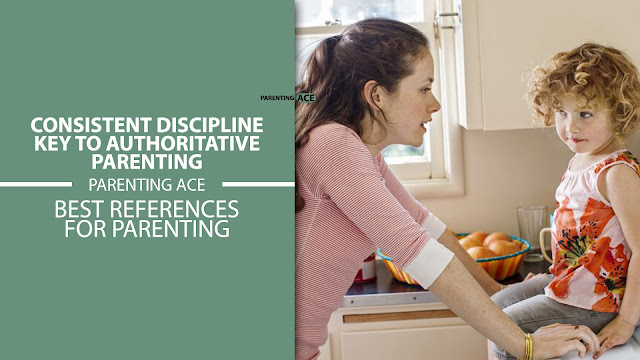Consistent Discipline: A Cornerstone of Authoritative Parenting
Welcome to our latest blog post, where we explore the foundational concept of consistent discipline within the context of authoritative parenting. As we delve into this topic, we'll uncover how consistent discipline forms the backbone of an approach that balances warmth, responsiveness, and firm guidance, fostering a nurturing environment for children to thrive emotionally, socially, and academically. Join us as we unravel the principles, benefits, and challenges associated with consistent discipline, offering insights into how it shapes resilient and responsible individuals within the framework of authoritative parenting.
 |
| Consistent Discipline: Key to Authoritative Parenting |
In the realm of parenting, consistency is often heralded as a vital component, particularly concerning discipline. Consistent discipline forms the bedrock of the authoritative parenting style, renowned for its balance of warmth, responsiveness, and firm guidance. This approach to discipline fosters an environment of mutual respect, understanding, and growth, laying the groundwork for children to thrive emotionally, socially, and academically.
Understanding Authoritative Parenting
Before delving into the nuances of consistent discipline, it's essential to grasp the broader framework of authoritative parenting. Characterized by high levels of warmth and responsiveness coupled with clear expectations and boundaries, authoritative parents maintain a nurturing yet structured approach to raising their children. They prioritize open communication, mutual respect, and autonomy within a supportive framework, fostering a positive parent-child relationship built on trust and understanding.
The Role of Consistent Discipline
Consistent discipline serves as a cornerstone of authoritative parenting, providing children with a sense of security, predictability, and accountability. Unlike authoritarian parenting, which may rely on harsh punishments and rigid control, authoritative parents employ discipline as a means of teaching and guiding rather than simply enforcing compliance. By consistently upholding predetermined rules and consequences, parents demonstrate fairness, reliability, and respect for their child's development and autonomy.
Key Principles of Consistent Discipline
- Clear Expectations: Authoritative parents establish clear expectations and rules, ensuring that children understand what behaviors are acceptable and what consequences may ensue for disobedience. These expectations are communicated openly and respectfully, allowing children to internalize and adhere to them willingly.
- Consistent Enforcement: Consistency is paramount in authoritative parenting. Parents follow through with predetermined consequences consistently and fairly, regardless of circumstances or emotions. This consistency reinforces the message that actions have consequences and fosters accountability and self-regulation in children.
- Positive Reinforcement: While consequences for misbehavior are necessary, authoritative parents also emphasize positive reinforcement for desired behaviors. Acknowledging and rewarding good behavior strengthens the parent-child bond, motivates children to repeat positive actions, and reinforces the importance of self-discipline and responsibility.
- Open Communication: Consistent discipline is underpinned by open communication between parents and children. Authoritative parents listen empathetically to their children's perspectives, explain the rationale behind rules and consequences, and encourage dialogue to resolve conflicts constructively. This communication fosters mutual understanding, trust, and cooperation within the parent-child relationship.
Benefits of Consistent Discipline
Consistent discipline within the framework of authoritative parenting yields numerous benefits for children's development:
- Emotional Regulation: Children learn to manage their emotions and impulses effectively, promoting emotional resilience and self-control.
- Social Skills: Consistent discipline teaches children valuable social skills such as empathy, cooperation, and conflict resolution, preparing them for healthy interpersonal relationships.
- Academic Success: With clear expectations and consistent boundaries, children are better equipped to focus on learning, leading to improved academic performance and motivation.
- Self-Esteem: By experiencing fair and consistent discipline, children develop a positive sense of self-worth and confidence in their abilities, fostering a healthy self-esteem.
Challenges and Considerations
While consistent discipline within authoritative parenting offers numerous benefits, it is not without its challenges. Parenting requires adaptability and flexibility, and finding the right balance between consistency and individual needs can be complex. Additionally, external factors such as cultural influences, family dynamics, and socioeconomic status may impact the implementation of consistent discipline practices.
Consistent discipline lies at the heart of authoritative parenting, providing a framework for nurturing well-rounded, responsible, and emotionally resilient children. By establishing clear expectations, maintaining consistency in enforcement, and fostering open communication, authoritative parents create an environment conducive to positive development and growth. Through consistent discipline, parents empower their children to navigate life's challenges with confidence, integrity, and compassion, ultimately shaping them into capable and compassionate individuals ready to contribute positively to society.



Comments
Post a Comment